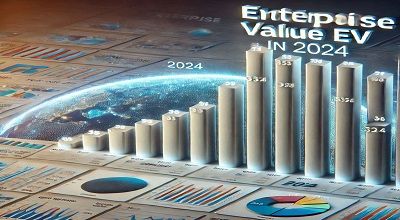Enterprise Value (EV)
Enterprise Value (EV) is a fundamental financial metric used to assess the total value of a company. Taking into account both its equity and debt. It provides a comprehensive view of a company’s worth, incorporating factors beyond just its market capitalization. Understanding EV is crucial for investors, analysts, and business professionals to evaluate investment opportunities, conduct financial analysis, and make informed decisions.
Components of Enterprise Value
EV comprises several components:
- Market Capitalization (Market Cap): Market cap represents the total value of a company’s outstanding shares in the public market. It is calculated by multiplying the current stock price by the total number of shares outstanding.
- Debt: Debt includes all forms of financial obligations owed by the company. Such as loans, bonds, and other liabilities. Debt is a crucial component of EV as it reflects the company’s obligations to creditors.
- Cash and Cash Equivalents: Cash and cash equivalents refer to liquid assets held by the company. Including cash in hand, bank deposits, and short-term investments that can be readily converted into cash. Cash reduces the net cost of acquisition. The company uses it to offset a portion of its debt.
- Minority Interests: Minority interests represent the portion of subsidiaries’ equity not owned by the company. It is important to include minority interests in EV calculations to accurately reflect the company’s economic value.
Calculation of Enterprise Value
The formula to calculate Enterprise Value is:
- EV = Marker Cap + Debt – Cash + Minority Interests
- EV=MarketCap+Debt−Cash+MinorityInterests
Interpreting Enterprise Value
Enterprise value provides a holistic view of a company’s value, considering its capital structure and financial obligations. A higher EV indicates a larger financial commitment required to acquire the company. Conversely, a lower EV relative to a company’s revenue. Or earnings may suggest that the company is undervalued.
Use Cases of Enterprise Value
- Mergers and Acquisitions (M&A): EV is extensively used in M&A transactions to determine the fair value of a target company. Potential acquirers assess the target’s EV to evaluate the feasibility and cost-effectiveness of the acquisition.
- Valuation Analysis: Analysts use EV as a key metric in valuation models. Such as discounted cash flow (DCF) analysis and comparable company analysis (CCA) to derive a fair market value for a company’s equity.
- Debt Analysis: EV helps in evaluating a company’s ability to repay its debt obligations. By comparing EV to earnings before interest, taxes, depreciation, and amortization (EBITDA). Analysts can assess a company’s leverage and financial health.
Summary
In conclusion, Enterprise Value is a comprehensive financial metric. That considers a company’s equity, debt, cash, and minority interests to determine its total value. It plays a critical role in investment analysis, M&A transactions, and financial decision-making. Providing insights into a company’s financial structure and overall worth.
